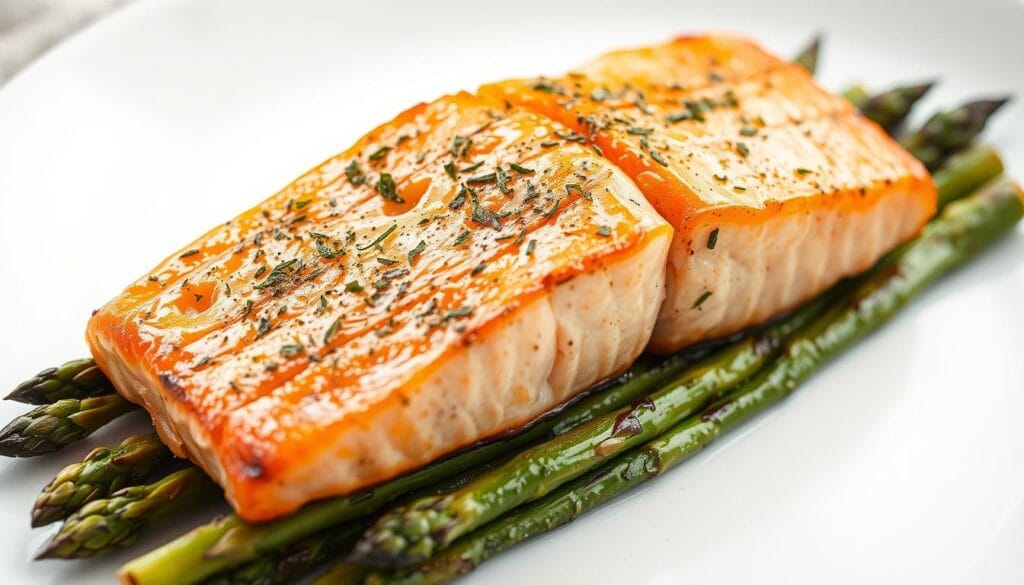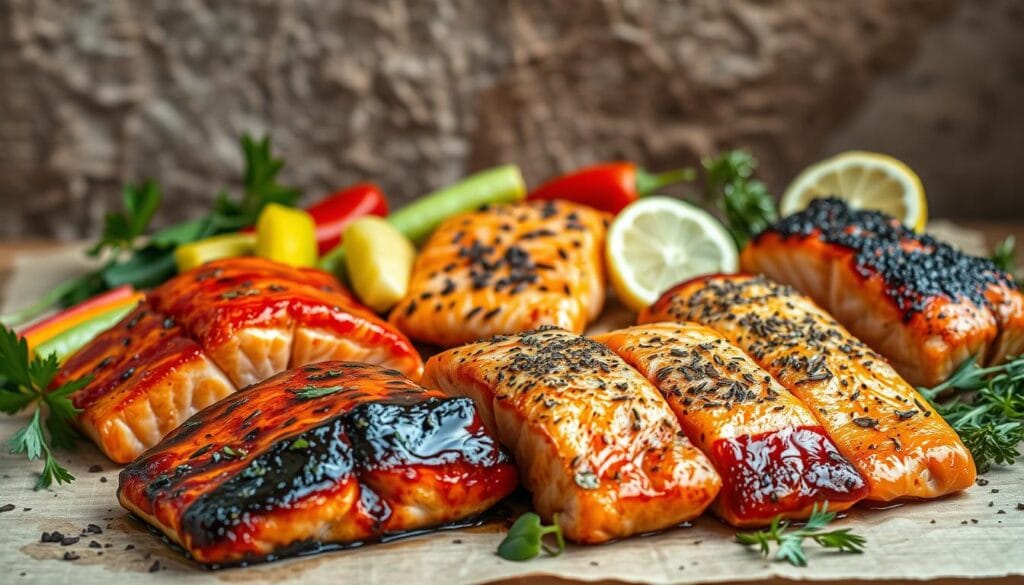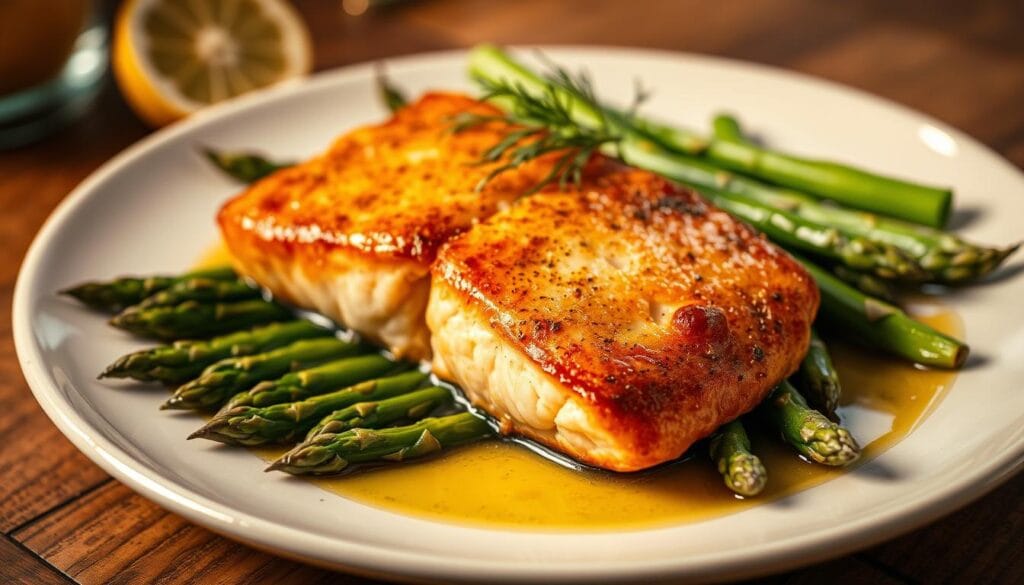Looking for a simple yet impressive dish for your next dinner? A healthy baked salmon is perfect. It’s not only tasty but also full of nutrients and easy to make.
Creating a delicious baked salmon recipe at home is easy. Just top the salmon with a zesty lemon butter sauce and fresh herbs. Then, bake until it’s tender and flaky.
Table of Contents
The Health Benefits of Salmon
Salmon is packed with omega-3 fatty acids and other nutrients. It’s a great choice for boosting your health. Adding healthy baked salmon to your meals can be very beneficial.
Nutritional Profile of Salmon
Salmon is full of nutrients. It offers many health benefits. Here’s what it has:
- High-quality protein: Essential for muscle repair and growth.
- Vitamins: Especially vitamin D and B vitamins, important for energy and health.
Protein and Vitamin Content
Salmon’s protein is top-notch, with all essential amino acids. It also has vitamins like vitamin D for bones and B vitamins for energy.
Minerals and Antioxidants
Salmon is rich in minerals and antioxidants. It has selenium, an antioxidant that protects cells. Salmon’s antioxidants also fight inflammation and cell damage.
Omega-3 Fatty Acids and Their Importance
Salmon is a superfood because of its omega-3 fatty acids. These fats are vital for our bodies but can’t be made by us. So, we need to eat them.
Heart Health Benefits
Omega-3s in salmon are good for the heart. They lower inflammation, triglycerides, and blood pressure. Eating healthy baked salmon can help your heart.
Brain Function and Anti-inflammatory Properties
Omega-3s are also key for brain health and development. They have anti-inflammatory effects, reducing disease risk. Salmon supports both heart and brain health.
Selecting the Perfect Salmon for Baking
Choosing the right salmon for baking is key. You have many options, each with its own traits.
Fresh vs. Frozen Salmon
Fresh salmon is often the top choice for its taste and texture. But, frozen salmon can be just as tasty, especially if it’s been frozen right. Frozen salmon is often frozen at sea, keeping it fresh.
Wild-Caught vs. Farm-Raised Salmon
Wild-caught salmon is known for its rich flavor and firm texture. Farm-raised salmon is often cheaper and can be more eco-friendly. Both can work well for a simple baked salmon recipe.
Different Salmon Varieties and Their Flavors
There are several types of salmon, each with its own taste. The main types include:
Atlantic, Sockeye, and Coho Salmon
Atlantic salmon has a mild taste. Sockeye salmon is known for its deep, rich flavor. Coho salmon offers a balance of taste and texture.
King and Pink Salmon
King salmon is famous for its buttery taste. Pink salmon has a lighter flavor. The choice depends on your taste preference for baked salmon.
Essential Ingredients for a Healthy Baked Salmon Recipe
A healthy baked salmon recipe is about the right ingredients and simple cooking. You’ll need a few key items to enhance the salmon’s flavor without extra calories.
Base Ingredients
The basic ingredients are simple. You’ll need fresh salmon fillets, wild-caught or farm-raised. Also, some fat like olive oil or butter keeps the salmon moist. A squeeze of fresh lemon juice adds brightness and balances the fish’s richness.
Healthy Seasoning Options
Seasoning lets you get creative with your baked salmon. There are many healthy options to choose from.
Herbs and Spices
Garlic, parsley, and dill are great herbs for salmon. Use them fresh or dried, as you prefer. For a spicy kick, add paprika or cayenne pepper.
Low-Sodium Alternatives
For those watching sodium, there are low-sodium options. Try herb blends or lemon zest for flavor without salt. A small amount of sea salt or kosher salt can also work well.
Optional Add-ins for Extra Nutrition
To make your baked salmon even healthier, add some veggies or nutrient-rich foods. Sliced lemons on top or around the salmon add flavor and look good. You can also roast asparagus, Brussels sprouts, or other veggies with the salmon for a full meal.
Kitchen Tools You’ll Need
Having the right kitchen tools is key for baking salmon perfectly. You’ll need some basic but essential equipment to get a deliciously baked salmon.
Essential Equipment
The tools you need for baking salmon are:
- Rimmed baking sheet
- Parchment paper or aluminum foil
- Small saucepan or skillet
Baking Sheets and Pans
A rimmed baking sheet is perfect for baking salmon. It keeps the fish from sliding off and makes cleaning up a breeze. You can also use parchment paper or aluminum foil for extra convenience.
Measuring Tools and Thermometers
Measuring cups and spoons are crucial for precise ingredient measurements. An instant-read thermometer helps check the salmon’s internal temperature. This ensures it’s cooked safely.
Optional Tools That Make the Process Easier
While not essential, some tools can simplify baking salmon. These include:
| Tool | Benefit |
|---|---|
| Fish fillet turner | Eases the flipping of salmon fillets |
| Silicone baking mats | Provides a non-stick surface and easy cleanup |
Preparing Your Salmon Before Baking
To get your baked salmon just right, start with the right prep. This means a few key steps. They boost the flavor and make sure the fish is cooked just right.
Cleaning and Portioning
First, clean and portion your salmon. Rinse the fillets under cold water and dry them with a paper towel. Then, cut them into the size you want. This removes impurities and helps cook evenly.
Removing Pin Bones
Then, take out the pin bones. Use tweezers or a small knife to gently pull out the bones. This is important for a smooth dining experience, as bones can be a nuisance.
Marinating Techniques for Enhanced Flavor
Marinating your salmon can really boost its taste. There are two main ways: quick marinades and overnight flavor infusion.
Quick Marinades
A quick marinade means soaking the salmon in your marinade for at least 30 minutes. It’s great when you’re in a hurry but still want great flavor.
Overnight Flavor Infusion
For even deeper flavor, try an overnight marinade. Put the salmon in your marinade and refrigerate it overnight. This lets the flavors soak into the fish more.
By following these steps, you’ll get your salmon ready for baking perfectly. This ensures a tasty and healthy meal.
The Perfect Baked Salmon Recipe Step-by-Step

To make the perfect baked salmon, follow this easy recipe. It ensures your dish is moist and full of flavor. Baking salmon is simple but requires some care. This guide will help you make a delicious meal.
Ingredients List
Here’s what you need for the best baked salmon:
- 4 salmon fillets (6 ounces each)
- 2 tablespoons olive oil
- 2 lemons, sliced
- 2 tablespoons fresh dill, chopped
- Salt and pepper to taste
- Optional: garlic powder, paprika
Preparation Instructions
Preparing your salmon for baking is easy:
Seasoning the Salmon
First, preheat your oven to 375°F (190°C). Then, drizzle olive oil over the salmon fillets. Season with salt, pepper, and herbs like fresh dill.
Arranging in the Baking Dish
Next, line a baking sheet with foil or parchment paper. Place the salmon fillets on it. Add sliced lemons on top for extra flavor.
Cooking Times and Temperatures
Cooking salmon in the oven needs precision for the perfect result.
Conventional Oven Method
Bake the salmon for 12-15 minutes. It should reach an internal temperature of 145°F (63°C).
Convection Oven Adjustments
For a convection oven, lower the temperature to 350°F (175°C). Cooking time should be 8-12 minutes.
| Oven Type | Temperature | Cooking Time |
|---|---|---|
| Conventional | 375°F (190°C) | 12-15 minutes |
| Convection | 350°F (175°C) | 8-12 minutes |
How to Tell When Your Salmon is Perfectly Cooked
To cook salmon perfectly, you need to pay close attention and use the right methods. There are several ways to make sure your salmon is cooked just right.
Visual Indicators of Doneness
One way to check if your salmon is cooked is by looking at it. Cooked salmon should look opaque and flake easily with a fork. If it’s still translucent or doesn’t flake, it’s not fully cooked.
Using a Thermometer for Precision
For a more precise check, use an instant-read thermometer. This tool helps you see the salmon’s internal temperature. It should reach 145°F (63°C) for it to be safe to eat.
Common Mistakes to Avoid
When cooking salmon, there are a couple of common mistakes to watch out for. These include overcooking and undercooking.
Overcooking Issues
Overcooking can make salmon dry and tough. To avoid this, keep an eye on the cooking time and temperature.
Undercooking Concerns
Undercooking, on the other hand, can lead to food safety issues. Always check the internal temperature to ensure it has reached a safe level.
Healthy Sauce and Topping Ideas
Make your baked salmon even better with these easy and tasty sauce and topping ideas. Just a few simple additions can turn a basic dish into a standout meal.
Yogurt-Based Sauces
Yogurt sauces add creaminess without the extra calories. Try a Dill and Cucumber Yogurt Sauce by mixing Greek yogurt with cucumber, dill, garlic, and lemon juice. Or, a Lemon Garlic Yogurt Drizzle with yogurt, lemon zest, garlic, and honey adds a zesty flavor.
Dill and Cucumber Yogurt Sauce
This sauce is perfect for hot days. Just mix all the ingredients in a bowl and chill for 30 minutes to blend the flavors.
Lemon Garlic Yogurt Drizzle
For a lighter choice, blend the ingredients in a bowl until smooth. Drizzle it over your salmon just before serving.
Herb and Citrus Toppings
Fresh herbs and citrus can really boost your salmon’s flavor. Top it with chopped parsley, dill, or basil, and some lemon or orange zest. The citrus adds a nice brightness to the salmon.
Vegetable Accompaniments
Pair your salmon with roasted or steamed veggies for a complete meal. Roast asparagus, Brussels sprouts, or carrots with olive oil, salt, and pepper.
| Topping/Sauce | Main Ingredients | Flavor Profile |
|---|---|---|
| Dill and Cucumber Yogurt Sauce | Greek yogurt, cucumber, dill, garlic | Cooling, refreshing |
| Lemon Garlic Yogurt Drizzle | Yogurt, lemon zest, garlic, honey | Tangy, slightly sweet |
| Herb and Citrus Toppings | Fresh herbs, citrus zest | Bright, herbaceous |
Delicious Variations of Baked Salmon

You can turn your baked salmon into a masterpiece with a few simple tweaks. Baked salmon is versatile, letting you play with flavors and ingredients. This way, you can make a dish that you’ll love.
Mediterranean-Style Baked Salmon
For a Mediterranean twist, add olives, sun-dried tomatoes, and feta cheese to your salmon. A sprinkle of oregano and olive oil will take you to the Mediterranean. This mix is tasty and full of nutrients.
Asian-Inspired Baked Salmon
For an Asian flavor, marinate your salmon in soy sauce, ginger, and sesame oil. Top it with scallions and sesame seeds for extra taste and texture. This dish is great for those who love Asian flavors.
Spicy Cajun Baked Salmon
For a spicy dish, try Spicy Cajun Baked Salmon. Rub your salmon with a mix of paprika, cayenne pepper, and garlic powder. Bake until it’s done. This adds a bold, spicy flavor to your meal.
| Variation | Key Ingredients | Flavor Profile |
|---|---|---|
| Mediterranean-Style | Olives, sun-dried tomatoes, feta cheese | Salty, tangy, herby |
| Asian-Inspired | Soy sauce, ginger, sesame oil | Savory, slightly sweet, umami |
| Spicy Cajun | Paprika, cayenne pepper, garlic powder | Spicy, smoky, bold |
Nutritious Side Dishes to Pair with Your Baked Salmon
Baked salmon tastes better with healthy side dishes. The right sides boost nutrition and flavor.
Vegetable Sides
Vegetables are great for their nutrients and variety. Here are two top picks:
Roasted Vegetable Medley
A mix of Brussels sprouts, carrots, and bell peppers is colorful and nutritious. Just toss with olive oil, salt, and pepper, then roast until soft.
Fresh Salad Pairings
A salad with mixed greens, cherry tomatoes, and a light dressing is refreshing. Add avocado or grilled peaches for more taste and health benefits.
Whole Grain Accompaniments
Whole grains like quinoa and brown rice are fiber-rich. They’re great with salmon, making meals filling and balanced. Season them with herbs for extra flavor.
| Whole Grain | Nutritional Benefits | Pairing Ideas |
|---|---|---|
| Quinoa | High in protein and fiber | Mix with roasted vegetables and a citrus vinaigrette |
| Brown Rice | Rich in manganese and selenium | Serve with steamed vegetables and a drizzle of olive oil |
Complete Meal Planning
Plan meals with baked salmon and various sides. Roasted veggies and whole grains make for a healthy meal. Add olive oil or avocado for extra fat.
Storing and Reheating Leftover Baked Salmon
Don’t let leftover baked salmon go to waste. Learn how to store and reheat it right. The right storage and reheating methods keep your salmon fresh and safe.
Proper Storage Methods
Keeping leftover baked salmon fresh is key. You have two main choices: refrigeration and freezing.
Refrigeration Guidelines
Put leftover baked salmon in an airtight container in the fridge for up to 3 days. Make sure the container is sealed well to keep out moisture and other tastes.
Freezing Options
If you won’t eat the salmon in 3 days, freeze it. Put the salmon in an airtight container or freezer bag. Remove as much air as you can before sealing.
Reheating Without Drying Out
Reheating leftover baked salmon needs care to avoid drying it out. Here are some ways to reheat it perfectly.
Oven Reheating Method
Reheat the salmon in the oven at 275°F (135°C) until it’s warm. This method keeps the salmon moist and flavorful.
Stovetop and Microwave Alternatives
You can also reheat the salmon on the stovetop over low heat or in the microwave. Use short intervals and check until it’s heated through. Be careful not to overheat.
| Reheating Method | Temperature/Time | Notes |
|---|---|---|
| Oven | 275°F (135°C) | Until warmed through |
| Stovetop | Low heat | Monitor closely to avoid overheating |
| Microwave | Short intervals | Check until heated through |
Conclusion
Now you know how to make a tasty and healthy baked salmon recipe. It’s packed with protein and omega-3s. Plus, it’s quick, easy, and can be made in many ways.
Try different flavors and ingredients to keep your salmon recipes exciting. You can add a Mediterranean or Asian twist. The choices are endless.
Adding baked salmon to your meals is a smart choice. It’s good for your heart and tastes great. So, give this recipe a try and enjoy the benefits of having baked salmon in your kitchen.

